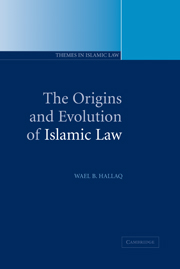Book contents
- Frontmatter
- Contents
- Maps
- Map 1 Arabia ca. 622 ad
- Map 2 Muslims lands in the third/ninth century
- Introduction
- 1 The pre-Islamic Near East, Muḥammad and Quranic law
- 2 The emergence of an Islamic legal ethic
- 3 The early judges, legal specialists and the search for religious authority
- 4 The judiciary coming of age
- 5 Prophetic authority and the modification of legal reasoning
- 6 Legal theory expounded
- 7 The formation of legal schools
- 8 Law and politics: caliphs, judges and jurists
- Conclusion
- Glossary of key terms
- Short biographies
- Bibliography
- Suggested further reading
- Index
6 - Legal theory expounded
Published online by Cambridge University Press: 05 June 2012
- Frontmatter
- Contents
- Maps
- Map 1 Arabia ca. 622 ad
- Map 2 Muslims lands in the third/ninth century
- Introduction
- 1 The pre-Islamic Near East, Muḥammad and Quranic law
- 2 The emergence of an Islamic legal ethic
- 3 The early judges, legal specialists and the search for religious authority
- 4 The judiciary coming of age
- 5 Prophetic authority and the modification of legal reasoning
- 6 Legal theory expounded
- 7 The formation of legal schools
- 8 Law and politics: caliphs, judges and jurists
- Conclusion
- Glossary of key terms
- Short biographies
- Bibliography
- Suggested further reading
- Index
Summary
From our discussions thus far, we have seen that by the beginning of the third/ninth century, the judiciary had reached a mature stage of development, with all its essential features having taken final shape. By this time, legal doctrine (or substantive law) had also become more comprehensive and detailed in coverage, with virtually no eventuality or case escaping the domain of religious legal discourse. Yet, while in other circumstances these two developments would have allowed us to declare a given legal system complete and fully developed, in the case of Islamic law it would be premature to do so; for the beginning of the third/ninth century set the stage for what might be called the pivotal scene in this legal drama. Put differently, while legal developments during the first two centuries of Islam were no mean feat, they were only the foundation of what was to be erected later. For there remained two absolutely essential and fundamental features of the law that had yet to emerge, or at least had not done so in any meaningful form. And it was not until a century and a half later – namely, until the middle or second half of the fourth/tenth century – that these two features took final hold and shape. These features were, first, the emergence and fundamental articulation of legal theory and, second, the formation of the doctrinal schools. This chapter will treat the first of these, while the second will be taken up in the next chapter.
- Type
- Chapter
- Information
- The Origins and Evolution of Islamic Law , pp. 122 - 149Publisher: Cambridge University PressPrint publication year: 2004



